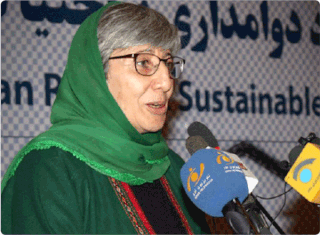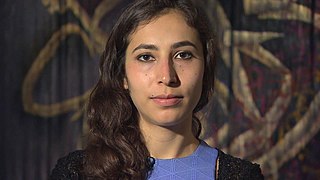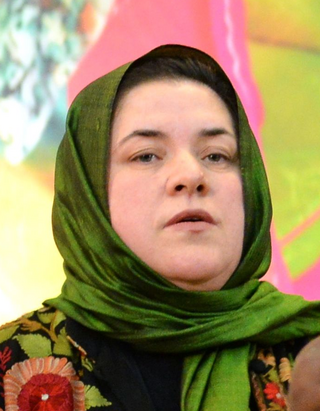Related Research Articles

The treatment of women by the Taliban refers to actions and policies by various Taliban regimes which are either specific or highly commented upon, mostly due to discrimination, since they first took control in 1996. During their first rule of Afghanistan (1996–2001), the Taliban were notorious internationally for their misogyny and violence against women. In 1996, women were mandated to wear the burqa at all times in public. In a systematic segregation sometimes referred to as gender apartheid, women were not allowed to work, nor were they allowed to be educated after the age of eight. Women seeking an education were forced to attend underground schools, where they and their teachers risked execution if caught. They were not allowed to be treated by male doctors unless accompanied by a male chaperone, which led to illnesses remaining untreated. They faced public flogging and execution for violations of the Taliban's laws.

Dr. Massouda Jalal is the first woman in the history of Afghanistan who ran for the Office of the President of Afghanistan in 2002, and again in 2004. She holds the distinction of being the first woman to compete for presidency in Afghanistan, a highly conservative society where women's engagement in public life was considered improper, unacceptable, and previously banned. Dr. Jalal emerged as a leading voice of Afghan women in 2001 after her election as the Representative to the 2002 Loya Jirga. While serving her term, she became one of the frontrunners for the position of Interim President, opposite to ex-president Hamid Karzai.

Sima Samar is an Afghan woman and human rights advocate, activist and medical doctor within national and international forums, who served as Minister of Women's Affairs of Afghanistan from December 2001 to 2003. She is the former Chairperson of the Afghan Independent Human Rights Commission (AIHRC) and, from 2005 to 2009, United Nations Special Rapporteur on the situation of human rights in Sudan. In 2012, she was awarded the Right Livelihood Award for "her longstanding and courageous dedication to human rights, especially the rights of women, in one of the most complex and dangerous regions in the world."

Women's rights in Afghanistan have oscillated back and forth depending on the time period as well as the regime in power. After King Amanullah Khan's attempts to modernize the country in the 1920s, women officially gained equality under the 1964 Constitution. However, these rights were taken away in the 1990s through different temporary rulers such as the mujahideen and the Taliban during the Afghan civil war. During the first Taliban regime (1996–2001), women had very little to no freedom, specifically in terms of civil liberties. When the Taliban was overthrown by the United States following the 9/11 attacks, women's rights gradually improved under the presidential Islamic Republic of Afghanistan. Women were de jure equal to men under the 2004 Constitution.

Leena Alam is an Afghan film, television, and theater actress. She has appeared in films such as Kabuli Kid, Black Kite, Loori, A Letter to the President and Hassan. She is widely known to have worked on film and TV that speak of child marriage, gender inequality, women's rights and social conflicts.

Aryana Sayeed is an Afghan pop singer and songwriter. She sings mostly in Dari but also has many songs in Pashto and some in Uzbek. Sayeed also had hosting roles in musical television shows for the 1TV and TOLO networks along with appearances on reality shows. Sayeed has established herself as one of Afghanistan's most famous contemporary musical artists, performing regularly in concerts and philanthropic festivals within and outside Afghanistan.

Malina Suliman is an Afghan graffiti artist, metalworker and painter. She was born in Kabul. As a child, she and her family were forced to flee her home province to live in Kandahar, Afghanistan. Her work is considered to challenge traditional Muslim culture like the burqa. According to Suliman, "The burqa is a way of controlling, but in the name of respect. Every culture or religion gives a different name for the burqa. It is honor, culture, and religion. Really, it just controls the woman and keeps her inside." Malina's work has gained the attention of the Taliban and traditional Muslims, resulting in having received threats from the Taliban towards Suliman and her family. The artist was subject to physical threats, rocks have been thrown at her as she conducts her work.
Farkhunda Zahra Naderi is an Afghan politician and women's right activist. She is a member of the Afghanistan's High Council for National Reconciliation (HCNR) chaired by Abdullah Abdullah. Previously she served as a senior advisor to president Ashraf Ghani in United Nations Affairs. Before that she served as a member of Parliament, where she was elected as an MP in the 2010 Afghan Parliamentary Election.

Nisrin Hader(2007) is an Afghan minister, gynecologist and obstetrician. She won awards for her work and in 2015 she was made a minister.

Shamsia Hassani is an Afghani street artist, a fine arts lecturer, and the associate professor of Drawing and Anatomy Drawing at the Kabul University. She has popularized "street art" in the streets of Kabul and has exhibited her art in several countries including India, Iran, Germany, United States of America, Switzerland, Vietnam, Norway, Denmark, Turkey, Italy, Canada, and in diplomatic missions in Kabul. Hassani paints graffiti in Kabul to bring awareness to the war years. In 2014, Hassani was named one of FP's top 100 global thinkers. She was recognized as one of the BBC's 100 women of 2021.

Farkhunda Malikzada, commonly referred to as Farkhunda, was a 27-year-old woman who was publicly lynched by a mob in Kabul, the capital of Afghanistan, on 19 March 2015. A large crowd formed in the streets around her claiming that she had burned the Quran, and for that, her accusers announced that she must be sent to Hell right away.
Seema Jowenda is an Afghan politician who is deputy governor of Kabul Province and was previously governor of Ghor province. As of November 2015, she was one of only two women to hold the position of provincial governor in the country. She replaced Sayed Anwar Rahmati in the job.
The Walking Artists Network (WAN) is an international network dedicated to walking as a critical and artistic practice; it reflects the growth and increased interest in walking art. It is based at the University of East London's Centre for Performing Arts Development and contains a network of over 600 members from across the globe, though predominantly based in the United Kingdom. The network maintains an active email discussion community through JISCmail.

Farida Momand is an Afghan doctor and politician who serves as Minister of Higher Education.

Roya Rahmani is an Afghan diplomat who served as Afghanistan's first female ambassador to the United States and non-resident ambassador to Mexico, Argentina, Colombia, and the Dominican Republic from December 2018 to July 2021. She is currently the Chair of the international advisory company in development finance — Delphos International LTD. She is also a distinguished fellow at the Georgetown Institute for Women, Peace, and Security, a senior advisor at the Atlantic Council's South Asia Center, and a senior fellow for international security at the New America Foundation. From 2016 to 2018, she served as Afghanistan's first female ambassador to Indonesia, first ever ambassador to the Association of Southeast Asian Nations, and non-resident ambassador to Singapore.

Sahraa Karimi is an Afghan film director and teacher currently based in Italy, who was notably the first female chairperson of the Afghan Film Organization. She has directed 30 short films, 3 documentary films and one fiction film Hava, Maryam, Ayesha which had the world premier at the 76th Venice Film Festival. Prior to the fall of Kabul to the hands of the Taliban, she was the first and the only woman to be directing Afghanistan's film entity.

Zarifa Ghafari is a former female mayor of Maidan Shahr, capital city of the Wardak Province, Afghanistan. Ghafari was one of the few Afghan female mayors, next to the first Afghanistan's mayor, Azra Jafari and Khadija Zahra Ahmadi, and was also the youngest to be appointed, at the age of 24. She is known for her efforts to advance women's rights in Afghanistan. Ghafari was chosen as an International Woman of Courage in 2020 by the US Secretary of State. She has survived three assassination attempts.
Kubra Noorzai (1932–1986) was an Afghan politician. She was the first woman to become a government minister in the country, serving as Minister of Public Health between 1965 and 1969.
Shafiqa Ziaie or Shafiqa Ziaye was an Afghan educator and cabinet minister. She belonged to the generation of pioneer women who attained public positions in Afghan society after the reforms of Mohammed Daoud Khan.
Zahra Joya is an Afghan journalist. She is the founder of Rukhshana Media, an outlet in Persian and English which she runs from exile.
References
- ↑ "Kubra Khademi - Women In War". Women In War. Retrieved 17 July 2016.
- 1 2 "Kubra Khademi - La Porte Peinte". La Porte Peinte. Retrieved 17 July 2016.
- ↑ Graham-Harrison, Emma (12 March 2015). "Afghan artist dons armour to counter men's street harassment". the Guardian. Retrieved 17 July 2016.
- ↑ Kubra Khademi (19 February 2016), Kubra & Pedestrian Sign/Kubra et les bonhommes piétons , retrieved 28 August 2016
- ↑ Kubra Khademi (15 June 2016), Eternal Trial , retrieved 28 August 2016
- 1 2 3 "Afghan artist in hiding after 'iron underwear' stunt". BBC News. Retrieved 17 July 2016.
- 1 2 3 "Afghan artist in hiding after sexual harassment protest - The Express Tribune". 8 March 2015. Retrieved 17 July 2016.
- ↑ "Afghan woman accused of seeking asylum after 'iron underwear' stunt - Khaama Press (KP) | Afghan News Agency". www.khaama.com. 4 May 2015. Retrieved 17 July 2016.
- ↑ BNU. "BNU > bnu news". www.bnu.edu.pk. Archived from the original on 28 August 2016. Retrieved 28 August 2016.
- ↑ "WALKING WOMEN - Events - Live Art Development Agency". Live Art Development Agency. Retrieved 17 July 2016.